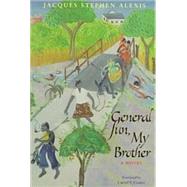- ISBN: 9780813918907 | 0813918901
- Cover: Paperback
- Copyright: 11/1/1999
The first novel of the Haitian novelist Jacques Stephen Alexis, General Sun, My Brother appears here for the first time in English. Its depiction of the nightmarish journey of the unskilled laborer Hilarion and his wife from the slums of Port-au-Prince to the cane fields of the Dominican Republic has brought comparisons to the work of Emile Zola, Andr Malraux, Richard Wright, and Ernest Hemingway. Alexis, whose mother was a descendant of the Revolutionary General Jean-Jacques Dessalines, was already a mature thinker when he published General Sun, My Brother (Comp re G n ral Soleil) in France in 1955. A militant Marxist himself, Alexis championed a form of the "marvelous realism" developed by the Cuban novelist Alejo Carpentier, who called for a vision of historical reality from the standpoint of slaves for whom the supernatural was as much a part of everyday experience as were social and other existential realities. General Sun, My Brother opens as Hilarion is arrested for stealing a wallet and imprisoned with an activist named Pierre Roumel--a fictional double for the novelist Jacques Roumain--who schools him in the Marxist view of history. On his release, Hilarion meets Claire-Heureuse and they settle down together. Hilarion labors in sisal processing and mahogany polishing while his partner sets up a small grocery store. After losing everything in a criminally set fire, the couple joins the desperate emigration to the Dominican Republic. Hilarion finds work as a sugarcane cutter, but the workers soon become embroiled in a strike that ends in the "Dominican Vespers," the 1937 massacre pf Haitian workers by the Dominican army. The novel personifies the sun as the ally, brother, and leader of the peasants. Mortally wounded in crossing the Massacre River back into Haiti, Hilarion urges Claire-Heureuse to remarry and to continue to work for a Haiti where people can live in dignity and peace.







